
Efficient numerical methods for non-local operators PDF
442 Pages·2010·2.146 MB·English
Most books are stored in the elastic cloud where traffic is expensive. For this reason, we have a limit on daily download.
Preview Efficient numerical methods for non-local operators
Description:
Hierarchical matrices present an efficient way of treating dense matrices that arise in the context of integral equations, elliptic partial differential equations, and control theory. While a dense $n\times n$ matrix in standard representation requires $n^2$ units of storage, a hierarchical matrix can approximate the matrix in a compact representation requiring only $O(n k \log n)$ units of storage, where $k$ is a parameter controlling the accuracy. Hierarchical matrices have been successfully applied to approximate matrices arising in the context of boundary integral methods, to construct preconditioners for partial differential equations, to evaluate matrix functions, and to solve matrix equations used in control theory. $\mathcal{H}^2$-matrices offer a refinement of hierarchical matrices: Using a multilevel representation of submatrices, the efficiency can be significantly improved, particularly for large problems. This book gives an introduction to the basic concepts and presents a general framework that can be used to analyze the complexity and accuracy of $\mathcal{H}^2$-matrix techniques. Starting from basic ideas of numerical linear algebra and numerical analysis, the theory is developed in a straightforward and systematic way, accessible to advanced students and researchers in numerical mathematics and scientific computing. Special techniques are required only in isolated sections, e.g., for certain classes of model problems. A publication of the European Mathematical Society (EMS). Distributed within the Americas by the American Mathematical Society.
See more
The list of books you might like
Most books are stored in the elastic cloud where traffic is expensive. For this reason, we have a limit on daily download.
